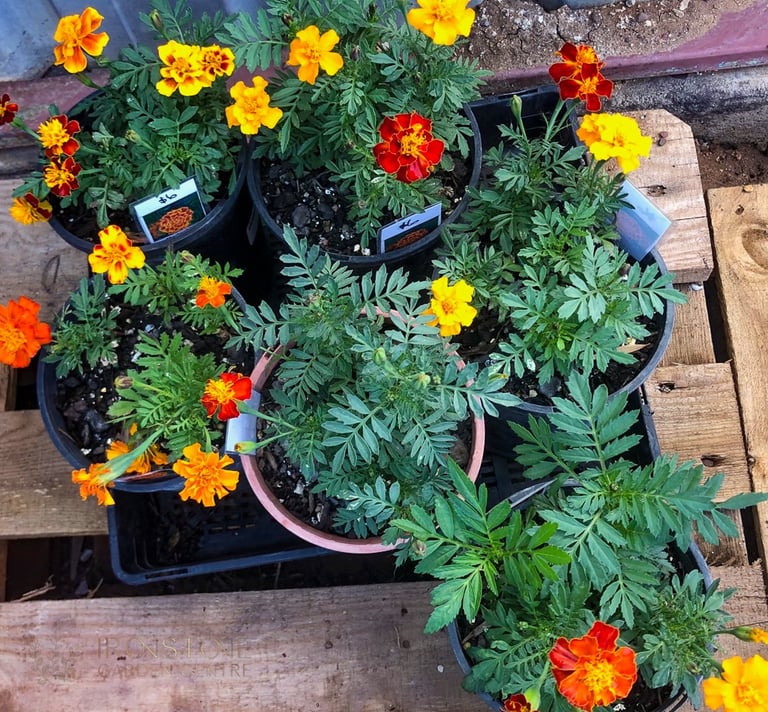The Secrets Behind Gardeners' Love for Marigolds


Gardening is a labour of love, a harmonious dance between nature and nurturing hands. For centuries, gardeners have sought ways to enhance their crops' health and productivity, and one timeless companion found in vegetable patches around the world is the humble marigold. These vibrant, golden flowers are a visual delight and serve many purposes that make them indispensable to gardeners. This blog will explore why gardeners turn to marigolds and uncover the secrets behind their enduring popularity.
1. Pest Control and Companion Planting
One of the primary reasons gardeners incorporate marigolds into their vegetable patches is their natural ability to ward off pests. Marigolds release compounds into the soil that act as a natural deterrent to nematodes, microscopic worms that can wreak havoc on the roots of many vegetable plants. The compounds released by marigolds, such as limonene and alpha-terthienyl, create an inhospitable environment for nematodes, reducing their population and protecting vegetable crops.
Moreover, marigolds are excellent companions for various vegetables because they can repel harmful insects. The pungent aroma of marigolds masks the scent of nearby vegetables, making it challenging for pests to locate their target plants. This concept, known as companion planting, is a sustainable and organic pest control method practised for generations.
2. Soil Enrichment and Weed Suppression
Marigolds are not just beautiful additions to the garden; they are also natural soil enhancers. These hardy flowers thrive in various soil conditions and contribute to soil fertility when planted in vegetable patches. Marigolds have a symbiotic relationship with beneficial microorganisms in the soil, promoting a healthy and well-balanced ecosystem. Their roots excrete substances that improve soil structure, making it more conducive to plant growth.
In addition to enriching the soil, marigolds suppress weeds. The dense foliage of marigold plants creates a natural ground cover that shades the soil, inhibiting the growth of unwanted weeds. This weed-suppressing effect helps vegetable plants by reducing competition for nutrients and water, allowing them to flourish without the hindrance of invasive vegetation.
3. Attracting Beneficial Insects
While marigolds repel harmful pests, they also play a crucial role in attracting beneficial insects to the garden. The bright hues of marigold flowers are irresistible to pollinators such as bees and butterflies, essential for pollinating many vegetable crops. By creating an environment that attracts these pollinators, gardeners can significantly improve the yield and quality of their vegetables.
Furthermore, marigolds are a magnet for predatory insects that feed on common garden pests. Ladybugs, for example, are drawn to marigold flowers and are known for consuming aphids, mites, and other harmful insects. This natural pest control helps maintain a delicate balance in the garden ecosystem, ensuring harmful pests are kept in check without chemical interventions.
4. Disease Resistance and Soil Sterilisation
Marigolds possess natural compounds that exhibit antifungal properties, effectively preventing certain soil-borne diseases. The roots of marigold plants release substances that suppress the development of harmful pathogens, including Fusarium and Rhizoctonia, which can negatively impact the health of vegetable crops.
In addition to their disease-resistant qualities, marigolds are known for their soil sterilisation properties. This makes them particularly useful in rotation planting, where gardeners alternate the crops grown in specific areas each season to prevent the buildup of soil-borne diseases. Marigolds can be planted in these rotation cycles to help cleanse the soil and create a healthier growing environment for subsequent vegetable crops.
5. Low Maintenance and Aesthetically Pleasing
Gardeners appreciate marigolds' low-maintenance nature, making them ideal for both seasoned enthusiasts and beginners. These resilient flowers are easy to grow, requiring minimal care and attention. Their adaptability to various soil types and growing conditions makes them a reliable and stress-free addition to any vegetable patch.
Beyond their practical benefits, marigolds contribute to the overall aesthetics of the garden. The vibrant colours – ranging from sunny yellows and oranges to deep reds – add a touch of warmth and cheerfulness to the green canvas of vegetable patches. The visual appeal of marigolds enhances the overall gardening experience, turning the vegetable patch into a visually stunning and inviting space.
From their prowess in pest control and companion planting to their role in soil enrichment and disease resistance, marigolds offer many benefits that make them a gardener's best friend. Their low-maintenance nature and aesthetic appeal further solidify their place in the hearts and plots of gardeners worldwide. As we continue to explore sustainable and organic gardening practices, the golden touch of marigolds will undoubtedly remain an enduring and cherished tradition in horticulture.


